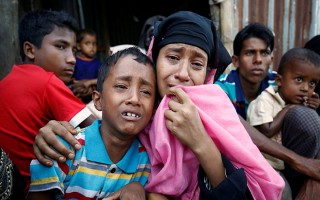OIC envoy calls for UN role
Organisation of Islamic Cooperation special envoy to Myanmar stressed the need for United Nations intervention to avoid genocide of Rohingyas stopping further escalation of violence in Rakhine State, as the international organisation convened a special meeting of foreign ministers of the member countries today.
The envoy also criticised the international community for merely observing the situation without playing any role in stopping violence in Rakhine State.
‘The OIC should seek UN intervention,’ said the envoy, Syed Hamid Albar, to Reuters in Kuala Lumpur. ‘We don’t want to see another genocide like in Cambodia or Rwanda,’ he said.
‘The international community just observed, and how many people died? We have lessons from the past, for us to learn from and see what we can do,’ he said.
An estimated 66,000 Rohingya Muslims fled indiscriminate killing, rape, arson and violence in Rakhine State and entered Bangladesh, as of January 12, since October 9, 2016, according to the United Nations Office for the Coordination of Humanitarian Affairs.
Myanmar authorities, however, denied the allegations of atrocities insisting that it was an internal matter of the country as security operations were launched after nine cops were killed in attacks on border security posts.
The envoy, however, said that the occurrence was ‘no longer an internal issue but of international concern.’
More than 40 Myanmar-based civil society organisations an Wednesday demanded a ‘truly independent’ international investigation into human rights violation in Rakhine State.
They recommended ‘a commission of inquiry to fully assess the totality’ of the situation and provide clear recommendations for the government to effectively address the crisis and prevent further problems in Rakhine State.
The 57-member OIC called a special meeting of the Council of the Foreign Ministers at the request of Malaysia, a member of ASEAN. Myanmar is also a member of ASEAN.
The OIC, according to its charter, is mandated to work to protect and promote rights and interests of minority Muslims in non-member countries.
State minister for foreign affairs Shahriar Alam is expected to present Bangladesh’s position in the meeting.
Tens of thousands of minority Rohingyas also fled atrocities in Rakhine state to Thailand, Malaysia, Indonesia and India over the years, as the Myanmar authorities passed a law in 1982 denying citizenship and fundamental rights of minority Muslims living in Rakhine state for generations, making them stateless.
About 33,000 registered refugees of Myanmar and 3,00,000 undocumented nationals of Myanmar have been staying in Bangladesh for years
In September 2016, former UN secretary general Kofi Annan, head of the nine-member advisory commission formed by Myanmar state counsellor Aung San Suu Kyi to identify challenges for the government in Rakhine State, publicly clarified that the commission would not conduct ‘human rights investigation’ in the state.
On January 3, 2017, state-run media published the interim findings of government-appointed 13-member commission led by Myint Swe, an army general, which reported no human rights violations and denied allegations of the crime of genocide and religious persecution.
- See more at: http://www.newagebd.net/article/7237/oic-envoy-calls-for-un-role#sthash.E6giODGl.dpuf











